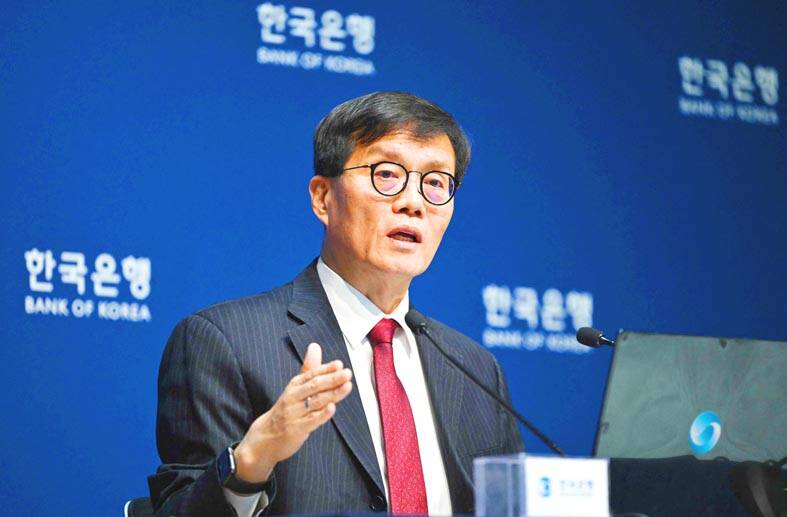The political turmoil in South Korea is weighing on the economy, Bank of Korea (BOK) Governor Rhee Chang-yong said yesterday, suggesting that authorities might downgrade growth forecasts and take stabilizing actions in response.
There is a high chance South Korea’s GDP would grow 2.1 percent this year rather than 2.2 percent as projected earlier, Rhee said as he assessed the economic impact of the turbulence that began when South Korean President Yoon Suk-yeol briefly imposed martial law earlier this month.
Rhee also raised doubts about whether the economy next year would expand 1.9 percent as forecast last month, calling for more fiscal support and other measures to ensure growth remains unimpeded.

Photo: AFP
The BOK is scheduled to make its next interest-rate decision next month.
Rhee said that the central bank would consider economic data to determine whether it would accelerate its policy.
Most economists expect the bank to take a breather next month after back-to-back cuts from October to last month.
A rate cut by the US Federal Reserve — with a decision expected yesterday — might give the BOK more room for easing if necessary, Rhee said.
Rhee expressed some relief over a decrease in political uncertainty after the parliament on Saturday voted to impeach Yoon for his martial law debacle.
“Volatility in domestic financial and foreign exchange markets has shown signs of stabilization after surging in the wake of the martial law declaration,” Rhee said. “While uncertainty remains, the political schedule ahead is now considered somewhat clearer.”
After turmoil erupted over the martial law decree, the authorities intervened in foreign exchange markets via what they call smoothing operations and would continue to do so should volatility become excessive, Rhee added.
The won has weakened by about 30 won against the US dollar since the martial law decree, he said.
Its level, which stood at about 1,435 per US dollar yesterday, should “normalize” according to economic fundamentals if South Korea’s policymaking process becomes stable again, he said.
Separately, South Korean Minister of Finance Choi Sang-mok said that the government is seeking to front-load its budget spending in the first half of next year to bolster the economy amid the political turmoil.
The government would “mobilize fiscal resources including those for public institutions, private investment, policy financing and so on,” Choi said. “We will also prepare additional measures to support vulnerable populations.”

In a small town in Paraguay, a showdown is brewing between traditional producers of yerba mate, a bitter herbal tea popular across South America, and miners of a shinier treasure: gold. A rush for the precious metal is pitting mate growers and indigenous groups against the expanding operations of small-scale miners who, until recently, were their neighbors, not nemeses. “They [the miners] have destroyed everything... The canals, springs, swamps,” said Vidal Britez, president of the Yerba Mate Producers’ Association of the town of Paso Yobai, about 210km east of capital Asuncion. “You can see the pollution from the dead fish.

MULTIFACETED: A task force has analyzed possible scenarios and created responses to assist domestic industries in dealing with US tariffs, the economics minister said The Executive Yuan is tomorrow to announce countermeasures to US President Donald Trump’s planned reciprocal tariffs, although the details of the plan would not be made public until Monday next week, Minister of Economic Affairs J.W. Kuo (郭智輝) said yesterday. The Cabinet established an economic and trade task force in November last year to deal with US trade and tariff related issues, Kuo told reporters outside the legislature in Taipei. The task force has been analyzing and evaluating all kinds of scenarios to identify suitable responses and determine how best to assist domestic industries in managing the effects of Trump’s tariffs, he

TIGHT-LIPPED: UMC said it had no merger plans at the moment, after Nikkei Asia reported that the firm and GlobalFoundries were considering restarting merger talks United Microelectronics Corp (UMC, 聯電), the world’s No. 4 contract chipmaker, yesterday launched a new US$5 billion 12-inch chip factory in Singapore as part of its latest effort to diversify its manufacturing footprint amid growing geopolitical risks. The new factory, adjacent to UMC’s existing Singapore fab in the Pasir Res Wafer Fab Park, is scheduled to enter volume production next year, utilizing mature 22-nanometer and 28-nanometer process technologies, UMC said in a statement. The company plans to invest US$5 billion during the first phase of the new fab, which would have an installed capacity of 30,000 12-inch wafers per month, it said. The

ASML Holding NV, the sole producer of the most advanced machines used in semiconductor manufacturing, said geopolitical tensions are harming innovation a day after US President Donald Trump levied massive tariffs that promise to disrupt trade flows across the entire world. “Our industry has been built basically on the ability of people to work together, to innovate together,” ASML chief executive officer Christophe Fouquet said in a recorded message at a Thursday industry event in the Netherlands. Export controls and increasing geopolitical tensions challenge that collaboration, he said, without specifically addressing the new US tariffs. Tech executives in the EU, which is